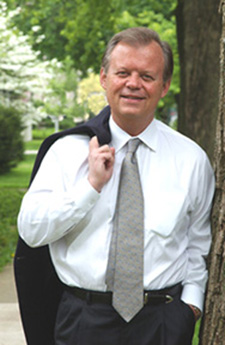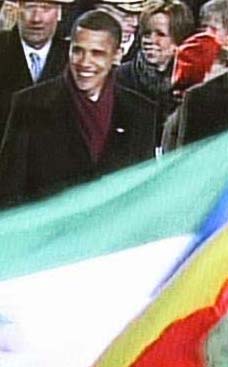
Mr. Hall’s plain-spoken style was in contrast to the stunning numbers he presented in his talk, like the fact that 25,000 people die every day from hunger, and that one-half of the world lives on less than two dollars a day. “It’s a ‘tale of two worlds’ today,” he observed. “The rich and the poor.” As the child of an affluent family, he said that his eyes were opened to society’s disconnects during his two years in the Peace Corps. His deep religious faith was part-and-parcel of going to Congress and performing public service, although serving his Dayton constituency sometimes seemed at odds with his frequent trips to countries like Ethiopia, where he saw “25 children die in a minute” from hunger. Visiting a poorly-equipped clinic, he watched as one beleaguered doctor had to choose just five children from among thousands for treatment. Former Congressman Tony Hall of Ohio was ambassador to the United Nations Agencies for Food and Agriculture and served as a Peace Corps Volunteer in Thailand in the 1960's.
Three-Time Nobel Nominee Tony Hall Talks About Mother Teresa, Poverty, Hunger
Three-Time Nobel Nominee Tony Hall Talks About Mother Teresa, Poverty, Hunger
Ellen Gilbert
Former U.S. Ambassador Tony P. Hall, the longest-serving Congressman from Ohio and three-time Nobel Peace Prize nominee, recently talked about his book, Changing the Face of Hunger. “Maybe it should have been called ‘Do The Thing That’s In Front of You,’” he said in the “Public Life and Faith” talk he gave at the Woodrow Wilson School last week.
In one of the many anecdotes he used that afternoon to explain how he became a leading advocate for hunger relief programs and improving international human rights conditions, Mr. Hall described one of his first encounters with Mother Teresa in the 1970s. Overwhelmed by the sheer number of broken bodies in their path as they walked down a Calcutta street, he wondered how anyone could possibly make a difference. “Where do you start?” he recalled asking her. She responded by picking a person lying in front of them and bringing him back to her hospice, where, according to Mr. Hall, he was “washed and loved.” The answer to his question, as Mother Teresa later told him, is “to do the thing that’s in front of you.”
Mr. Hall’s plain-spoken style was in contrast to the stunning numbers he presented in his talk, like the fact that 25,000 people die every day from hunger, and that one-half of the world lives on less than two dollars a day. “It’s a ‘tale of two worlds’ today,” he observed. “The rich and the poor.” As the child of an affluent family, he said that his eyes were opened to society’s disconnects during his two years in the Peace Corps. His deep religious faith was part-and-parcel of going to Congress and performing public service, although serving his Dayton constituency sometimes seemed at odds with his frequent trips to countries like Ethiopia, where he saw “25 children die in a minute” from hunger. Visiting a poorly-equipped clinic, he watched as one beleaguered doctor had to choose just five children from among thousands for treatment.
Closer to home, Mr. Hall involved Ohioans in fund-raising activities for food relief centers, and established gleaning programs that salvage crops that people typically don’t want. His biblical erudition was key in this effort, with the idea for gleaning — leaving crops at the corners of fields for poor people to gather — coming from The Book of Ruth. In Ohio, Mr. Hall’s volunteer program began when he discovered that a local farmer was about to plow under several acres of imperfect corn (they were off by three or four grains). “Imagine gleaning across 50 states,” Mr. Hall mused, adding that 110 million tons of food are wasted every year in the U.S.
Mr. Hall invoked the Bible again in 1993, when Congress decided to eliminate the Select Committee on Hunger he then chaired. Citing Isiaih 58, he began to fast, saying that he would “stop when Congress gets a conscience.” Thinking at first that “no one would understand,” he was astonished at the amount of attention he received (“a lot of good things happened,” he observed in his understated way). He ended his fast after 22 days (“I was everybody’s best friend”), when the World Bank scheduled a conference and allocated $100 million to eradicate hunger. Although the Select Committee was not reinstated, the Congressional Hunger Center was established as a result.
A great deal of work remains to be done to eliminate world hunger, Mr. Hall said. By continuing to rely on primitive technology, Africa is producing the same amount of food as it did 30 years ago. Saying that members of Congress are unaware of the plight of Africans, Mr. Hall called on U.S. citizens to take a more active role, visiting their representatives “once a year” to “put them on the spot. You should demand that they go out into the world and see what’s going on.”













